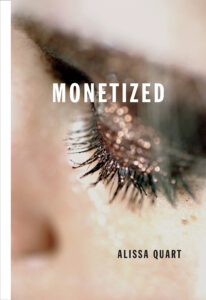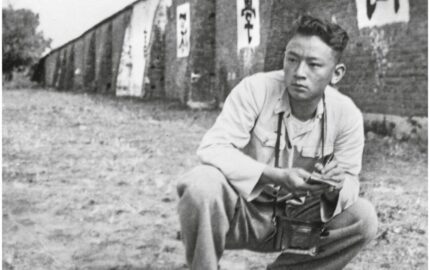
Alissa Quart, a 2010 Nieman Fellow, is suddenly all over the place. Last week she chatted with Slate Money about her first book of poetry, “Monetized,” which this week turned up in a good spot on New York magazine’s Approval Matrix. Quart, the author of three nonfiction books, said her turn to poetry for her new book was inspired by an Advanced Poetry class she took with Jorie Graham during her year at Harvard. “Monetized” was published on March 15 by Miami University Press. She discussed the intersection of poetry and journalism in this exchange with Nieman Reports:
Commercialism has been a theme of your work for some time. What can you do in poetry that you can't do with journalism (and vice versa)?
Commercialism and what the digital age calls “monetization” are a major theme of my new poetry book. My journalism is also trained on the same things: the commodification of ordinary life and of self, how the American middle class is economically squeezed and stymied. These preoccupations all seep into the poetry. This is an example:
Bus stops move with
product. Streaming, advertorial, posted, scraped,
mined. Reading is fracking.
I am obsessed with how book authors are so passé that they are “stemware of the old regime” as one of my poems puts it, and the ways in which people of my generation, caught between publishing’s 1970’s Golden Age and the social network, are lost in the mix (or, as I write, “forgotten/by second wavers.”) The economic downturn, especially for culture workers, the death of the creative class as it’s sometimes called now, is the centerpiece of many of these poems.
Poetry seems well-suited to the online world and yet it doesn't seem to have blossomed there like it could. What might change that?
I’d love to see poetry go online more, and have lots of algorithmic children. Partly it’s because I think Twitter is the ultimate poetic form—140 characters—but people don’t tweet or hashtag poetry as much as they should. Why not? On the other hand, there’s a whole poetry school, Flarf, which uses spam and spam e-mails heavily.
With The New York Times Magazine recently adding a poem to its weekly line-up, what are the prospects for bringing the worlds of journalism and poetry into a closer alliance?
The Times Magazine’s inclusion of poetry, edited by Natasha Trethewey, is a great start. But I’d like to mention that some poets actually use journalistic practices in their work, so the alliance between poetry and reporting goes the other way as well. Tan Lin did a series of poems that doubled as restaurant reviews. And recently, one of the ultimate versions of this was a New York magazine poem that went viral, using NYT lines about anonymous sourcing. A lot of my own poetry is actually about journalism (“strapped to the masthead” is a satirical sample line).
Instrumental
By Alissa Quart
There, reading against the traffic, a car
crash between chapters.
Alphabet via street
signs: C is for Con Ed.
Kids’ music
meant an actual kid, singing to herself past
the silent billboards.
■
Then those days—when you were starting out,
as they say—you were sulfur
frozen at The Odeon
when strapped to the masthead,
every remark, aside,
sharpened.
The table by the mirror reserved
for all the baby lionesses.
And now. You are living the app.
A pop-up. La Vida App!
■
An instrument of life,
of instrumental life.
In those days—raised by the book, zine,
velveteen couch. African
violet. Your face in the spider
plants. World of Our Fathers, Serpico edition.
Hairy men bearing
Bronx-Yonkers vowels.
Famous daughters’ names
hidden, like classical music in restaurants.
Children hide under oak tables.
Everyone under nine is “Outta sight!”
■
All stars, all likes. All nothing.
And you know, it’s so much like every culture
business in which you are really nothing,
with some handler/mother/father guiding you along
toward option or percent or foreign.
You are something waiting to be nothing or vice
versa. As value is circulation.
The Twitter Dead Souls told me.
■
Ann says in Minnesota it was
peer therapy on the phone or over coffee
or on plush ottomans.
You’d talk for an hour then
the peer for her hour.
Unlike a real friendship, so to speak,
each person had to listen
their allotted time.
Now, the ads talk to us all
in cars. Bus stops move with
product. Streaming, advertorial, posted, scraped,
mined. Reading is fracking.
BabywithiPad.jpg
Friends are what we handle.
Too many words,
not enough ears.
— From “Monetized,” by Alissa Quart. Published by Miami University Press. Reprinted with permission.


